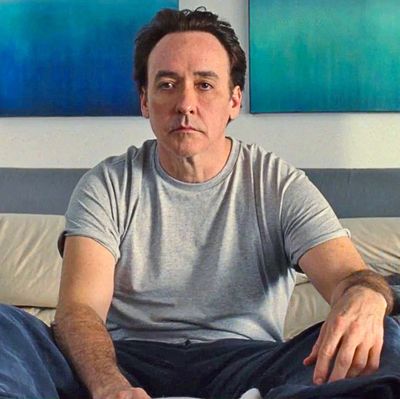
Even the best biopics leave so much out — they telescope, elide, spin, and downright lie — that some of us go straight from the theater to the library or bookstore, eager to correct the fallacies before they set. That’s what I did last week after seeing the Brian Wilson saga Love and Mercy, which weaves together scenes from two stages of the Beach Boy’s tumultuous life and features two different Brians, Paul Dano (’60s) and John Cusack (’80s). I’d lost my heart to the movie but still didn’t trust it. I wanted to fact-check it, to do my part to protect Wilson’s legacy, even — maybe especially — from people (the filmmakers, Wilson’s second wife) claiming to have his best interests in mind. (Wilson’s combination of aching music and grim personal history seems to stir everyone’s savior instincts.) After powering through three books, many articles, and a documentary, I can now say that Love and Mercy has whopping gaps but that few of them matter. It has the two things a Brian Wilson story needs above all: a sense of mystery and the right vibrations — good, bad, weird.
The vibe is heavy from the first scene, set in an L.A. Cadillac dealership where Cusack’s Brian settles into a car alongside a puzzled but game salesperson named Melinda Ledbetter (Elizabeth Banks). Gazing on something we have a feeling we’ll never see, he catches and blurts out stray thoughts: Blue is a calm color. His brother died. Cusack is too familiar (and mannered) to disappear entirely into the role, but his rhythms are fresh — a little bebop, a little Rain Man, enough empty silence that you feel you could put him to your ear and hear the surf. The key is what passes between him and Banks. Her Melinda is speechless but the kind of speechless where you can see five different thoughts competing in her head, none strong enough to dominate, with the result that she finally listens and — before she knows who he is — picks up on his plaintive music. A large man emerges from the shadows to say, “Brian, come out of the car,” and another, smaller man (Paul Giamatti) with a fulsome autumnal toupee who turns out to be Brian’s legal guardian–Svengali, Dr. Eugene Landy, tugs him out of the dealership. But by then Brian has bought the car and gotten Melinda’s name. We know at once that she can save him from whatever bad place he’s in.
There are no relationships as vivid in the film’s ’60s scenes, but Dano’s rhythms are even more revelatory. Dano does disappear into Wilson. He has the same round, baby face and humming vagueness. Conducting the session musicians who made Pet Sounds (the other members of the Beach Boys are performing without him in Japan, and this post-fun-fun-fun surfer music isn’t what they want to play anyway), he makes you understand — see — how Wilson could wander in his head from key to key, creating melodies that turn dissonant and somehow resolve, the harmony always hard-won and containing the seeds of its own dissolution. He’s both committed to his peculiar wavelength and pitifully in need of approval. We can hardly believe when he plays “God Only Knows” for his father, Murry (Bill Camp) — with whom he lives and who sits, scowling, in his bathrobe, with a drink in his hand — and the patriarch dismisses it as “wishy-washy … a love song and a suicide note.” Like the greatest art, “God Only Knows” seems always to have been with us, somewhere in our collective unconscious, waiting to be set down by a genius. That its first and in some ways most important judge expresses annoyance is … an abomination.
If the script by Oren Moverman and Michael Alan Lerner has a controlling thesis, it’s that Wilson’s spirit was crushed by two domineering, deeply abusive father figures, and that only a strong woman (Melinda) could finally liberate him. Perhaps I’m oversimplifying their (fine) work. Moverman and Lerner are careful to insert disclaimers: Brian telling Melinda, “I think [my father] scared me into making good records,” and Landy insisting to Melinda (justly, I think) that when he seized control of Brian — then 300 pounds, bedridden, and addicted to alcohol and multiple drugs — he was in a death spiral. But it’s hard to see anything remotely constructive in the film in Murry’s violence or Landy’s naked greed. And though Camp makes Murry mean but layered, pathetic in his spasms of temper, Giamatti goes feral: He carries on like the diminutive supervillain in The Incredibles.
Love and Mercy catches the spectacular, drug-addled self-indulgence of the ’60s L.A. music scene only glancingly, and the other two Wilson boys, Carl (Brett Davern) and Dennis (Kenny Wormald), aren’t especially vivid. (There’s some score-settling in Jake Abel’s Mike Love, who’s every bit as nasty as the real one every time he opens his mouth in public.) But director Bill Pohlad (working with frequent Wes Anderson cinematographer Robert Yeoman) is extraordinarily sensitive to the amorphous nature of Wilson’s life and art, and Atticus Ross’s score creates a floating, evocative soundscape, which is Brian Wilson–esque without a trace of plagiarism.
It’s a pity the movie takes itself too seriously even to hint at the running joke in Peter Ames Carlin’s probing bio Catch a Wave: that the “Brian is back!” motif has been part of the Beach Boys’ marketing strategy for decades. Well, here it comes again, folks. And, as Love and Mercy proves, it does give you excitations.
*This article appears in the June 1, 2015 issue of New York Magazine.


